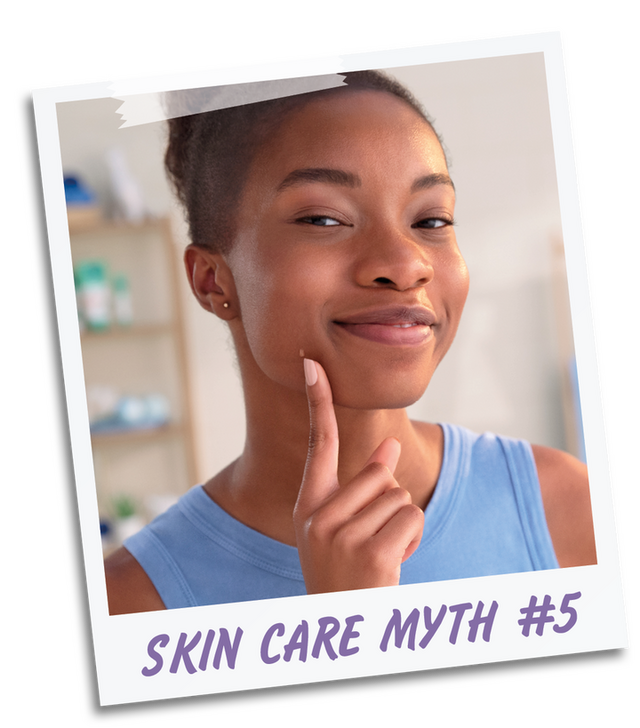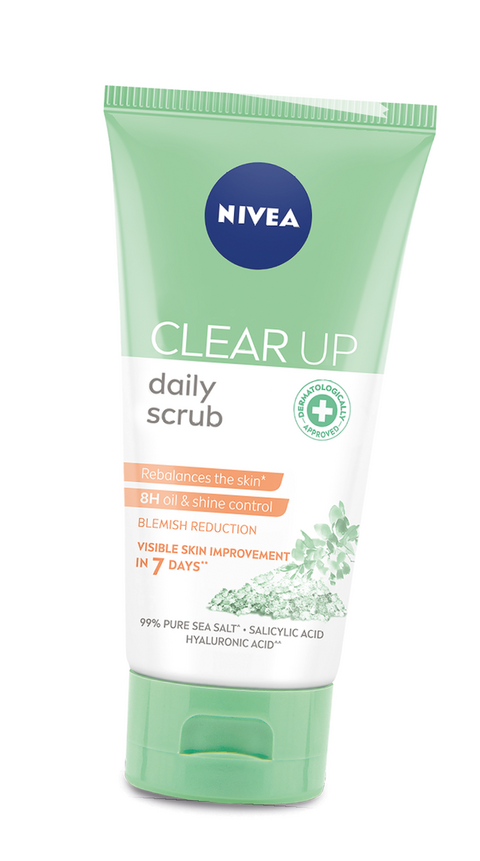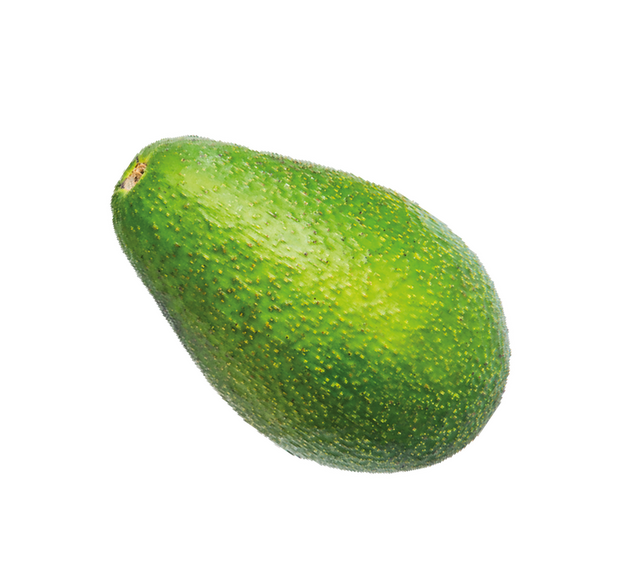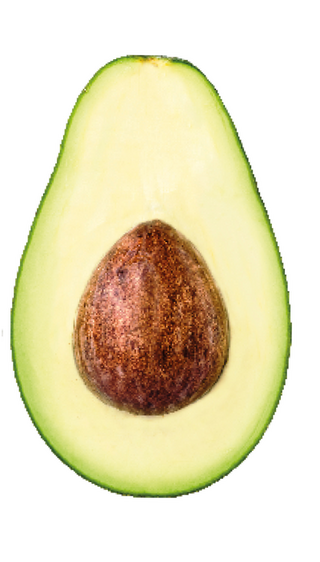So you thought only teenagers got pimples? LOL






While the majority – between 81% and 95% – of people who suffer from this legitimate inflammatory health condition are teenagers, this *doesn’t* mean that adults aren’t affected. In fact, around 32% of women and 21% of men also struggle with persistent blemishes. Not a vibe.
The reason that teenagers make up the majority when it comes to spotty skin is because of all the hormonal
changes taking place in their bodies. With
these shifts comes an
increase in sebum
production – an oily
substance that keeps your
skin naturally moisturised.
This, combined with sweat
and dirt on your face, can
lead to clogged pores and
breakouts. There is a
genetic component to
frequent spots as well: if
your parents dealt with
them, there’s a good
chance you might too.
Sigh.
Okay, so if puberty is
the culprit for the youth, what’s the deal with adults? Actually, there are several things that can cause pimple outbreaks over the age of 18. The first one is hormones, with hormonal spots usually being deeper in the skin and often located along the jawline and around
the mouth area. They are
also notoriously hard to
get rid of. Other causes
include stress, bacteria on
the skin, bodily inflammation,
exhaustion, a poor diet and not having an effective skincare routine. This means that by making some significant (but oh-so worth it!) lifestyle changes, you will likely experience a change in your complexion… but for the better!
If you frequently wake up to whiteheads and blackheads, you might have a bacterial build-up. This is something that can be easily changed by cleaning your towels and bed linen regularly, as well as creating – and being consistent with – a skincare routine. It doesn’t need to be elaborate, but it should involve twice-daily cleansing and moisturising. During the day (every single day), SPF is necessary for UV protection. Regular *gentle* exfoliation is also necessary for a smooth and radiant complexion, as it removes dead skin cells, preventing clogged pores and minimising breakouts.
Two other major factors that could be contributing to your blemish-prone skin are stress and a lack of sleep. Both can result in increased levels of cortisol – the stress hormone – in your body, which can lead to zits (and then, inevitably, even more stress!). Getting good-quality sleep for seven to nine hours a night is crucial for overall wellbeing, as is finding healthy ways to alleviate tension and anxiety for a chill, calm life.



While the majority – between 81% and 95% – of people who suffer from this legitimate inflammatory health condition are teenagers, this *doesn’t* mean that adults aren’t affected. In fact, around 32% of women and 21% of men also struggle with persistent blemishes. Not a vibe.
The reason that teenagers make up the majority when it comes to spotty skin is because of all the hormonal changes taking place in their bodies. With these shifts comes an increase in sebum production – an oily substance that keeps your skin naturally moisturised. This, combined with sweat and dirt on your face, and lead to clogged pores and breakouts. There is a genetic component to frequent spots as well: if your parents dealt with them, there’s a good chance you might too. Sigh.
Okay, so if puberty is the culprit for the youth, what’s the deal with adults? Actually, there are several things that can cause pimple outbreaks over the age of 18. The first one is hormones, with hormonal spots usually being deeper in the skin and often located along the jawline and around the mouth area.
They are also notoriously hard to get rid of. Other causes include stress, bacteria on the skin, bodily inflammation, exhaustion, a poor diet and not having an effective skincare routine. This means that by making some significant (but oh-so worth it!) lifestyle changes, you will likely experience a change in your complexion… but for the better!
If you frequently wake up to whiteheads and blackheads, you might have a bacterial build-up. This is something that can be easily changed by cleaning your towels and bed linen regularly, as well as creating – and being consistent with – a skincare routine. It doesn’t need to be elaborate, but it should involve twice-daily cleansing and moisturising. During the day (every single day), SPF is necessary for UV protection. Regular *gentle* exfoliation is also necessary for a smooth and radiant complexion, as it removes dead skin cells, preventing clogged pores and minimising breakouts.
Two other major factors that could be contributing to your blemish-prone skin are stress and a lack of sleep. Both can result in increased levels of cortisol – the stress hormone – in your body, which can lead to zits (and then, inevitably, even more stress!). Getting good-quality sleep for seven to nine hours a night is crucial for overall wellbeing, as is finding healthy ways to alleviate tension and anxiety for a chill, calm life.


Words: Helen Wallace; Statistic references: www.ncbi.nlm.nih.gov/pmc/articles/PMC5788264/, www.acne.org/how-common-is-adult-acne

Um no, your snack
today won’t break you
out tomorrow or






You probably heard people warn you growing up that eating a chocolate bar or drinking a cooldrink would give you pimples. We’re here to tell you that that is a lie!
So what’s the real tea?
Here’s what is true: your diet does play an important role in your overall health and wellness, which applies to your skin and its functioning, too. But this doesn’t mean that indulging in the occasional sweet or greasy treat is going to wreak havoc with your complexion. Like many things in life, however, they are obviously best enjoyed in moderation. This is because excess sugar consumption is linked to bodily inflammation, which can trigger skin conditions and breakouts.
So, what should your mostly healthy diet include? Firstly, plenty of water! You should be guzzling down about two litres – or eight cups – of H2O each day, and more if you are breaking a sweat or chilling in the sun. By doing this, you keep your body, and therefore your skin, properly hydrated. Two other important nutrients for skin health include antioxidants and omega acids. The former can be found in a lot of the food we eat on a regular basis, such as berries, red and yellow vegetables – including peppers, tomatoes and carrots – and also many spices. Omega acids can be found in fatty fish, such as herring, salmon and anchovies, as



well as avocados and a variety of nuts, grains and seeds. And the nutritional powerhouse known inwellness circles as dark leafy greens, which include spinach and kale, contains skin-loving vitamins. Eating foods with a high-water content, such as watermelon and cucumber, can also add to your hydration levels.
While it’s hard to eat healthy food all the time, it should make up the main part of our diet.
Maybe our parents were trying to scare us away from eating food they considered unhealthy. Or maybe it was a way of ensuring that we made good food choices. Whatever the reason for your (misguided) belief that your diet is responsible for your pimples, it ends today. And
don’t feel guilty
about eating
that occasional
snack – we
promise your skin
will survive!
Words: Helen Wallace

Um no, your snack
today won’t break you
out tomorrow or






You probably heard people warn you growing up that eating a chocolate bar or drinking a cooldrink would give you pimples. We’re here to tell you that that is a lie!
So what’s the real tea?
Here’s what is true: your diet does play an important role in your overall health and wellness, which applies to your skin and its functioning, too. But this doesn’t mean that indulging in the occasional sweet or greasy treat is going to wreak havoc with your complexion. Like many things in life, however, they are obviously best enjoyed in moderation. This is because excess sugar consumption is linked to bodily inflammation, which can trigger skin conditions and breakouts.
So, what should your mostly healthy diet include? Firstly, plenty of water! You should be guzzling down about two litres – or eight cups – of H2O each day, and more if you are breaking a sweat or chilling in the sun. By doing this, you keep your body, and therefore your skin, properly hydrated. Two other important nutrients for skin health include antioxidants and omega acids. The former can be found in a lot of the food we eat on a regular basis, such as berries, red and yellow vegetables – including peppers, tomatoes and carrots – and also many spices. Omega acids can be found in fatty fish, such as herring, salmon and anchovies, as well as avocados and a variety of nuts, grains and seeds. And the nutritional powerhouse known in wellness circles as dark leafy greens, which include spinach and kale, contains skin-loving vitamins. Eating foods with a high-water content, such as watermelon and cucumber, can also add to your hydration levels.



While it’s hard to eat healthy food all the time, it should make up the main part of our diet.
Maybe our parents were trying to scare us away from eating food they considered unhealthy. Or maybe it was a way of ensuring that we made good food choices.
Whatever the reason for your
(misguided) belief that your
diet is responsible for your
pimples, it ends today.
And don’t feel guilty
about eating that
occasional snack
– we promise your
skin will survive!
Words: Helen Wallace
